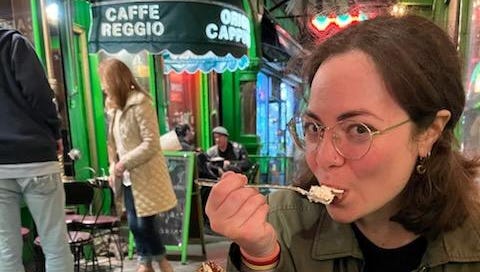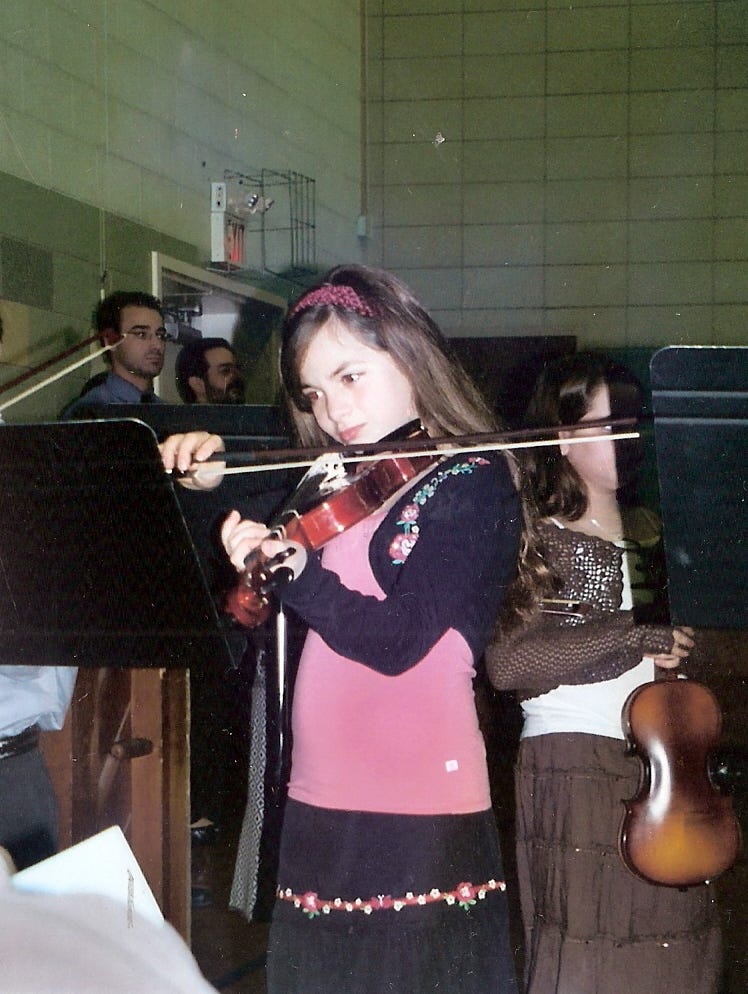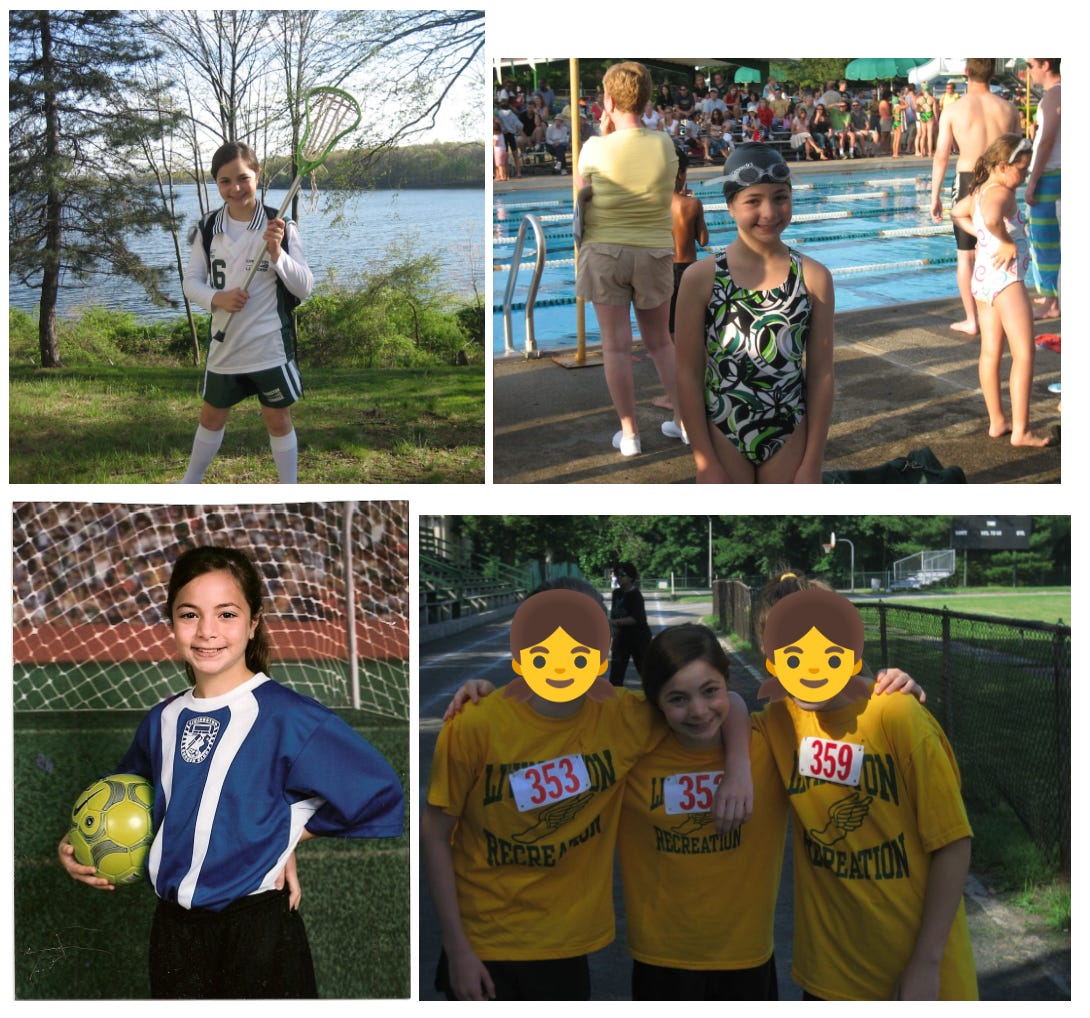I’ve been told that I never had a problem with pickiness. I was born ready to eat, and ate everything in front of me with delight. My hunger and I were closely linked — my moods known to dramatically shift from gentle doe to angry demon whenever I felt hunger. My family would say, “She gets cranky.”
I can’t say when it began. I remember feeling incredibly afraid of gaining weight to a degree that, in retrospect, was chillingly normal to me. Like many fears, it didn’t come out of thin air. Beauty standards have always existed, and probably always will. But beauty standards are intentionally difficult, sometimes impossible, to achieve. Because, if everyone could achieve it, it wouldn’t be special.
It’s true that Hollywood and the beauty industries have come a long way in showcasing a wider range of bodies, but it’s not enough to break what author and artist Bunny Michael has coined, our Learned Hierarchical Beliefs (LHB’s). Beauty rankings feed into the false illusion that “attractive” people are better and more deserving of love and success. Sure, maybe we can accept that everyone is beautiful “in their own way,” but, within the hierarchy, people who are thin, light-skinned, able-bodied, neurotypical, and heterosexual, just to name a few, are at the top of the imaginary beauty pyramid.
Growing up in the early 2000’s, it seemed like nearly every pop star, model, and “It Girl” of the time had a flat stomach, shrunken cheeks, and a thigh gap. I saw tabloid magazines in supermarket checkout lines with dramatic headlines about those same celebrities' weight loss or gain. Sometimes it celebrated them. Other times there was “concern.”
I also felt the presence of these beauty standards within my own lineage. I was far from the first person in my family to experience these pressures. My mother and her mother exist in bigger bodies. But this wasn’t always the case. I used to love looking at photos of my mom as a younger person. To me, she looked like a model. Beautiful curly hair, beautiful toothy smile, killer fashion sense. When we looked at photos together, she would often make remarks about her body; she missed being that skinny girl. I learned that she put herself on her first diet when she was 10 years old. She also tried many fad diets over the years that promised a quick dropping of pounds, if only you could handle the diet for long enough. She also took diet pills at different periods of time. I know my grandma did too.
“I always felt the best about myself when I was skinny,” my mother told me. Whenever she noticed my siblings or me gaining weight, or eating in excess, she’d turn herself into a cautionary tale, warning us: “I don’t want you to end up like me.”
I can only understand now, with my developed adult brain, that I learned to associate thinness with happiness. My mom was happier when she was thin, and unhappier when she wasn’t. Year after year, I watched her pick apart her own body while yearning, and struggling, to lose weight. I also witnessed this pressure on her from my father, who I occasionally overheard make comments about her body.
In some ways, she was right. I didn’t want to end up like her. I didn’t want to feel bad when I looked at my reflection. I didn’t want other people to comment on my body. And so I reasoned, to avoid that fate, I had to keep a watchful eye on myself. My fear of getting fat was already in full-swing by the time I was 7.
Hyperaware of my body and every piece of fat on it, I learned to coach my hunger into submission. I would tell myself:
Don’t eat another pizza slice.
You don’t need that dessert.
That has a lot of calories – order the salad instead.
That’ll make you gain weight…
I trained myself to suck-in my stomach at all times of the day so that it would look like I had less fat on my body. The problem with all of this was that, despite my decision to eat “better” and less, my early childhood appetite had not changed. My hunger felt like a curse that followed me everywhere I went, and my self-imposed restrictions only made me hungrier.
I learned about things like anorexia and bulimia in school and in television shows, but I never thought those things applied to me. With 20/20 hindsight though, I know, at the very least, that body dysmorphia did. When I first saw the picture above, as a fourth grader, I hated it. It was my first school concert, and I remember loving the outfit I was wearing, but I couldn’t bear to look at this image because I thought my stomach looked huge. It was all I could focus on. Looking at it now, I wish I could hug that little girl who didn’t know how to look at a picture of herself without criticism.
A question that sometimes floated through my household was, “You’re hungry again? But we just ate!” I became embarrassed about my hunger. Sometimes I ate in secret to avoid any commentary, but this hiding only made me feel more ashamed.
As I grew, sports became a part of my life. I tried nearly every recreational league that my hometown offered. Soccer, lacrosse, basketball, softball, track & field, swim, field hockey. I did have some good times, but I wouldn’t say I was ever particularly good at or passionate about any of these sports. I played because I wanted them to make my body better. Playing sports also meant I wouldn’t need to feel so guilty. If I put myself into situations where I was forced to run laps and do workouts, that meant I wouldn’t have to feel as bad about whatever I ate afterward. If I burned a lot of calories, eating felt more okay to do.
My older brother was a big eater like me. No, bigger. His appreciation for food was a sight to behold. At family dinners at my grandma’s house, I watched him pile mountains of my grandmother’s skillful cooking onto his plate. And, sometimes, he even got up for seconds. I liked getting seconds too, but I felt more embarrassed to do this as I grew.
My brother went to a fat camp when he was a teenager. I’m sure there’s a nicer name for it now, but that’s what everybody nicknamed it then. He and his fellow campers were there to have a fun summer and to make friends, but they also knew why they were all there specifically.
I think he had fun at that camp—I can’t really remember because I was pretty young at the time. He looked so different when he came back home. His whole body had shrunk and his face had sharper edges. I thought he looked really good, and he seemed happy about it too. I think he made the same association with thinness as I did. I do wonder about the food he ate at that camp. I hope it was good.
My sister, as a young child, was affectionately called “skinny-balink” by my grandmother. I noticed that this cute nickname wasn’t one that could be applied to the both of us. It made sense. Even though she was two years older than me, we could sometimes share clothes. However, my clothes were usually a tad too loose on her, and hers on me a tad too tight. Unlike my brother and I, she was very picky. Over time, I got so attuned to her pickiness that she would turn to me before trying something new, and I’d be able to tell her if she would like it or not. But then things changed when she became a preteen.
I suppose years of favoring carbs, meats, and very few fruits and vegetables, had caught up with her pubescent body. She gained weight over what felt like overnight. My view of her body completely changed and, in my head, our roles reversed. Suddenly she was the one struggling with extra weight while I was now the smaller one.
Growing up, I frequented many family-sized dressing rooms with her and my mom. My sister and I would try on clothes for school, and sometimes my mom picked up items for herself. We tried on everything in front of one another, modeled the results, and then gave opinions and critiques. I looked forward to these moments. It was fun to try on a bunch of clothes, talk about our outfits, and then possibly go home with something new.
I know my sister didn’t enjoy it as much though, perhaps in part because of her weight gain. She started to favor clothing that would cover her stomach, like sweatshirts.
Even though I enjoyed these shopping trips, I also struggled with them year to year. It felt like a personal failure whenever my size went up, or when a piece of clothing didn’t flatter me. Logically, I knew that I was growing up and that my body was supposed to change and get bigger. Emotionally, I lived in terror that my body would get too big and that I would hate it.
“That dress is really slimming!”
“That shirt shows your rollie-pollies...”
The latter description might sound cute, but there was no way any of us would ever buy clothing that fit that description. As I grew into a “woman’s body” as a teenager, I gained some weight myself. To reduce the rollie’s, especially in more fitted dresses, I began stuffing myself into tight spandex so that my waist would appear smoother and smaller.
In my sister’s early 20’s, she started to get sick. After a string of doctor visits and tests, we learned she had Crohn's disease. She lost a lot of weight when she was at her sickest, and I hated myself for being jealous of that.

I wanted to have a body that was considered attractive. I compared myself to other girls’ and womens’ bodies, ranking myself based on where I thought I existed within the “good body” spectrum. And it wasn’t purely bodies I compared to myself, but also ways of eating.
I had a friend in middle school who ate very little. One day, at her house after school, we immediately started doing homework. Always ravenous after school, I couldn’t believe she didn’t even possess the thought to eat at that time of day. I remember feeling so hungry but feeling too embarrassed to admit it. If she didn’t need food, then neither did I. She was thinner than me, and I quickly assumed this was why I had rollie pollies and she didn’t. I remember another classmate, who I didn’t know but saw in the cafeteria every day, that I noticed ate French fries every lunch. I watched her for weeks because I couldn’t believe it. Will she order fries again today? (She always did.) I felt envious that she could eat French fries every single day and somehow be so skinny.
Motivated to have a body with as little squish as possible, I began to restrict myself and make myself chew for an obscenely long time in the hopes that it would make me feel full faster. During my long-chewing era, still in middle school, I was at the mall with a friend and her dad. We stopped for lunch at a burger spot, and I ordered one. I ate a few bites of it and drank a lot of water. My friend's dad remarked, “You eat like a bird.” I took this as a compliment.
When I look back at photos of myself from my school days, I have the same trite realization as so many other people on this planet. “Oh wow, I looked fine and didn’t even know it. That was the smallest I ever was!” But I have issues with this. Why must we compare ourselves positively to versions of ourselves who were insecure and, arguably, making our lives less enjoyable? For the first 20-something years of my life, I spent countless hours obsessing over what I was eating, how my body looked to other people, and wishing I looked different. Personally, I don’t think it serves me at all to romanticize that period of time just because I had a “hotter” body.

College was a transitional time for my body image, as it is for many. Away from home for the first time, new friends and experiences, a meal card. I gained the infamous “Freshman Fifteen” from binging. I was smoking weed and drinking alcohol for the first time and, after the parties, many people wanted late-night snacks before going home. I used this as an excuse to eat the kind of junk food I usually told myself was off-limits. It was the kind of food I was too ashamed to eat while sober. Letting loose like that was a kind of rebellion. I’m drunk! Who cares if I eat pizza at 2am?
But then I did care. The quick weight gain freaked me out and, by sophomore year, I and another friend who had gained weight became each other’s “accountability buddies” at the school gym. One time, after a snowstorm, my friend and I trudged our feet through the deep, unplowed, snow to get to the gym. The gym, unsurprisingly, was pretty empty that day; it was just those of us who were, for whatever reason, unable to bear missing a workout. I learned after the fact that my parents were worried about my weight gain during that time. They didn’t say much, at least directly, because they knew it would upset me.
There’s more body diversity represented now than what I grew up with. This is progress. At the same time, weight-loss drugs like Ozempic are now part of the cultural zeitgeist. It's not that weight-loss drugs are a new invention. It’s notable, however, to see them return with such a vengeance—especially considering all the negative side-effects of diet drugs from decades past.
Bodies are not meant to fit into specific molds. We all have nutritional needs that vary from person to person. Bodies also naturally change over time due to things like aging, giving birth, and health or physical conditions. It has never made sense to rank beauty and health based on weight because there is no such thing as a one-size-fits-all approach to food and exercise. Is there an argument to be made that a lot of food in the U.S. is highly processed, filled with chemicals, and capable of causing health issues? Absolutely, but that’s not what I’m talking about here.
In any journey of caring for one’s body, the best way we can care for ourselves is through love—not self-bullying and restriction. My relationship with food and my body are not yet where I want them to be, but thankfully are eons improved from where I once was. To me, love for my body means eating when I’m hungry. It means trying my best to make healthy choices, but also giving myself treats because I enjoy them. It means replacing shame with compassion whenever I feel like I’ve committed a cardinal food sin. I do not have to define myself as someone with no self-control or poor decision-making skills.
Food is nourishment, but food is also emotion. It’s a wonderful thing to sit close to friends and family, enjoying the natural pleasures of a good meal and conversation. Sharing food is what we’ve done since the dawn of time. When we refuel with others, if we’re lucky, there is also delight. Delight in the meal, delight in the conversation.
These days, I like my body a lot more because I can now appreciate it for the ways it always does its best to keep me alive. It works hard to heal me when I get a cut or catch a cold. It alerts me to harmful situations. It’s also soft, warm, and tender. What a gift it is that we can carry softness, warmth, and tenderness with us everywhere we go.
Despite this renewed appreciation, I still have days where I’m not a fan of how my body has shown up in a picture or the mirror. But it’s okay. It is a process of continual acceptance. My body will keep changing as time floats on, and it is my task to keep loving it in its every iteration.
In a world that is still plagued by hunger and scarcity, having access to food is one of the greatest gifts. Obsessing over calories eaten and calories burned made me look at my body like a machine—one that I desperately tried to control. If I did the right things, even if it was unpleasant or harmful, it would eventually look the way I wanted it to. And by that logic, I would be happier and more admired.
Nourishing your body with intention is a sacred act. Your body is not only a physical form that holds your spirit, but a beautiful partner in your journey of life. You exist together, and you can love one another instead of engaging in rivalry.
After fighting my body for years, learning how to listen to its language is something I’ve had to learn all over again. I know that I must have known this language when I was really young, but it got quieter the more I ignored it. The language tells me when I’m hungry or full. The language alerts me to dehydration. The language tells me when I need to rest.
Learning how to listen again, and then acting upon these bodily notifications, has made my life so much brighter. It’s difficult to describe how profoundly it has affected me to give my body the things that it asks for. Wanting an extra helping of food is no cause for self-bullying—it is simply a neutral fact that my body is hungry. Needing to lay down for 20 minutes does not mean I am a horrible and lazy person—it means my body needs to recharge for a moment.
I love to eat, and for so long I resented how much I loved it. I felt like having an appetite meant I could never turn into the dreamgirls I idolized. Having hunger meant I didn’t have enough self-discipline. Binging meant I had weak morals. Gaining weight meant I would be unhappy. I don’t believe any of this anymore.
Because I am a dream girl. I’m a girl who can imagine a world where we appreciate every single person beyond their physical forms, and recognize that everyone holds equal value. I have a choice about how I feel about myself, and I choose to believe that I am a fucking icon. As a young person, I constantly told myself how ugly, weird, chubby, and gross, I was. I’m more than happy to swap out those terms. I am beautiful, bright, hot, sexy, fun. And how could I forget? Hungry.








love u gym accountability buddy ❤️
This is why I don't like to take pictures of myself. It's not that I think any picture of me is especially bad. The process of it just forces me to visualize myself as seen by other people, and I'm going to be absurdly, unreasonably harsh despite knowing full well that other people don't see it that way.
The "eat like a bird" comment especially reminded me of that. An expression that denotes worry, or concern, yet can feel like a compliment, somehow. I'm glad that you seem to have moved on from that kind of unhealthy thinking.